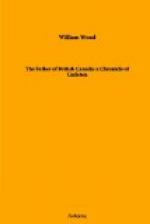The twelve years of Carleton’s first administration naturally fall into three distinct periods of equal length. During the first he was busily employed settling as many difficulties as he could, examining the general state of the country, and gradually growing into the change that was developing in the minds of the home government, the change, that is, from the Americanizing sixties to the French-Canadian seventies. During the second period he was in England, helping to shape the famous Quebec Act. During the third he was defending Canada from American attack and aiding the British counterstroke by every means in his power.
On the 22nd of September 1766 Carleton arrived at Quebec and began his thirty years’ experience as a Canadian administrator by taking over the government from Colonel Irving, who had held it since Murray’s departure in the spring. Irving had succeeded Murray simply because he happened to be the senior officer present at the time. Carleton himself was technically Murray’s lieutenant till 1768. But neither of these facts really affected the course of Canadian history.
The Council, the magistrates, and the traders each presented. the new governor with an address containing the usual professions of loyal devotion. Carleton remarked in his dispatch that these separate addresses, and the marked absence of any united address, showed how much the population was divided. He also noted that a good many of the English-speaking minority had objected to the addresses on account of their own opposition to the Stamp Act, and that there had been some broken heads in consequence. Troubles enough soon engaged his anxious attention—troubles over the Indian trade, the rights and wrongs of the Canadian Jesuits, the wounded dignity of some members of the Council, and the still smouldering and ever mysterious Walker affair.
The strife between Canada and the Thirteen Colonies over the Indian trade of the West remained the same in principle as under the old regime. The Conquest had merely changed the old rivalry between two foreign powers into one between two widely differing British possessions; and this, because of the general unrest among the Americans, made the competition more bitter, if possible, than ever.
The Jesuits pressed their claims for recognition, for their original estates, and for compensation. But their order had fallen on evil days all over the world. It was not popular even in Canada. And the arrangement was that while the existing members were to be treated with every consideration the Society itself was to be allowed to die out.




